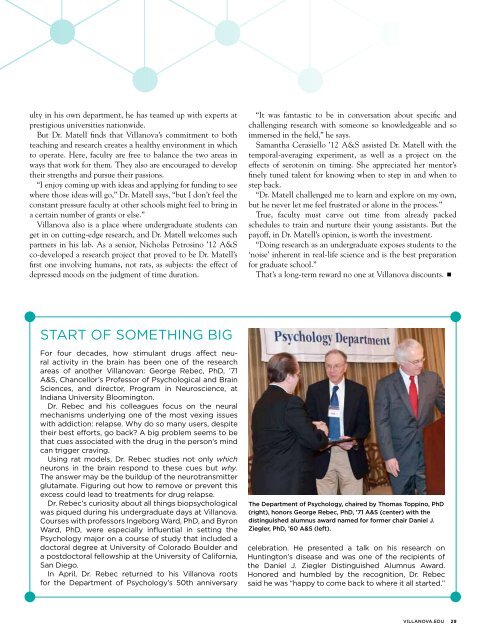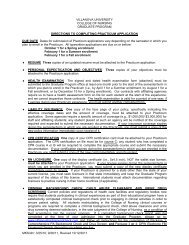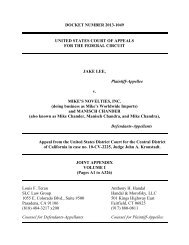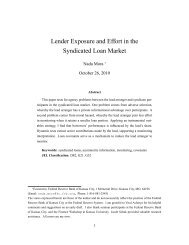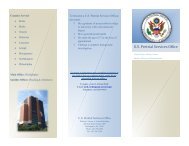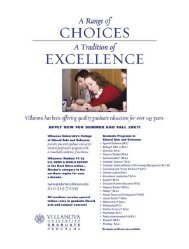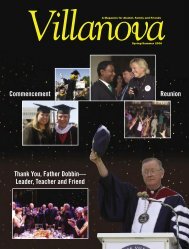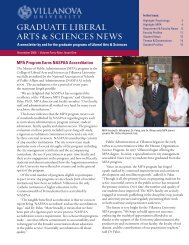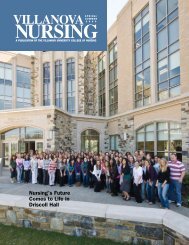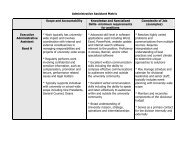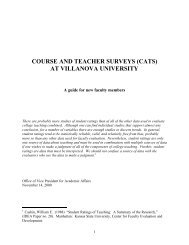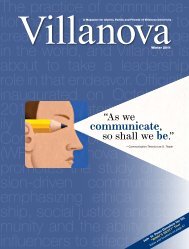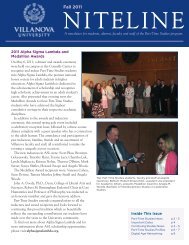Alexander Capuco ’13 A&S collects data from his brain to pilot anEvoked Response Potential experiment that will allow researchersto study neural activity during violations of a metronome tempo.<strong>University</strong> that he became intrigued by the particular puzzlethat would guide his career: How does the brain measure time?That’s a question that stymies scientists. We don’t have asense organ for time the way we do for light, sound and otherstimuli. Yet, without realizing it, we make judgments—and,depending on the circumstances, pretty accurate ones—abouthow long different time events last. Dr. Matell’s goal is toidentify and understand the neural and psychological mechanismsthat enable us to do it.“The ‘holy grail’ of my field is to figure out what neuralprocesses are used by the brain to judge how much timehas elapsed.”Dr. Matell’s significant findings have contributed to a body ofknowledge that is critical to a scientific understanding of temporallycontrolled behavior. “We time everything that happensand everything we do,” he says. “Only when things go awry dowe become aware that we are constantly evaluating time.”What’s it worth to you?Funded by a succession of grants from the National Institute onDrug Abuse (a component of the National Institutes of Health),Dr. Matell’s research in recent years has focused on how the useand abuse of addictive drugs such as cocaine and amphetaminesalter temporal perception and rate of delay discounting, both ofwhich affect the choices a drug-dependent person makes.“Delay discounting” describes a phenomenon familiar toall of us: mentally “marking down” the value of a future commodityor reward simply because we must wait for it, andchoosing instead a lesser commodity or reward that we canpossess now. A dilemma many of us dream about illustrates thisprocess: When I win the lottery, will I wait for the increasingpayments spread out over decades, or will I claim the smallerlump sum paid out immediately?Research shows that people addicted to drugs discount futurerewards more steeply than non-users—in part because psychostimulantsand hallucinogens speed up a person’s internal clock.Thus, when a person is in a drug-induced state, real time seemsslower. Temporal memories stored during this time seem longer.Dr. Matell and his colleagues have investigated their novelhypothesis about how drug-related changes in temporalperception affect delay discounting. Their experiments withrats suggest that people form temporal expectations about aparticular event—say, cooking dinner—by dipping into theirmemory bank and retrieving temporal memories labeled“cooking dinner.” However, if some of these memories werecreated in a drug-induced state (and thus feel longer) whileother memories were created in the absence of drugs (and feelmore like real-time duration), the two sets will be discrepant.To resolve the discrepancy, the brain averages the memoriestogether to construct a new memory. The result: a synthesizedexpectation that is longer than “normal” and thus diminishesthe value of enjoying a home-cooked meal down the road, ascompared to the immediate gratification of getting high now.The big-picture breakthrough for Dr. Matell is the recognitionthat memory is not infallible and that memory errors canchange behavior. “Your belief about how long a task is going totake could be due to your using a wrong, or biased, memory,” hesays. “That connection is potentially powerful. Our behaviorcan be a reflection of an altered memory rather than an alteredperceptual state.”These tantalizing insights into temporal averaging keephis lab humming with activity. They not only require furtherinvestigation but open the door to future areas of research. Ifaltered temporal expectations contribute to drug addiction, andif scientists can find ways to modify those expectations, thenusers, Dr. Matell theorizes, may be less likely to discount thevalue of future rewards and more likely to get off drugs. In themeantime, he and his colleagues are examining the synthesisof temporal memories across different drug states.Present … perfectDr. Matell is no stranger to institutions where faculty researchis primary, having done his undergraduate work at Ohio State<strong>University</strong> and served as a postdoctoral fellow at the <strong>University</strong>of Michigan. In addition to collaborating with prominent fac-28 <strong>Villanova</strong> MAGAZINe FALL <strong>2012</strong>
ulty in his own department, he has teamed up with experts atprestigious universities nationwide.But Dr. Matell finds that <strong>Villanova</strong>’s commitment to bothteaching and research creates a healthy environment in whichto operate. Here, faculty are free to balance the two areas inways that work for them. They also are encouraged to developtheir strengths and pursue their passions.“I enjoy coming up with ideas and applying for funding to seewhere those ideas will go,” Dr. Matell says, “but I don’t feel theconstant pressure faculty at other schools might feel to bring ina certain number of grants or else.”<strong>Villanova</strong> also is a place where undergraduate students canget in on cutting-edge research, and Dr. Matell welcomes suchpartners in his lab. As a senior, Nicholas Petrosino ’12 A&Sco-developed a research project that proved to be Dr. Matell’sfirst one involving humans, not rats, as subjects: the effect ofdepressed moods on the judgment of time duration.“It was fantastic to be in conversation about specific andchallenging research with someone so knowledgeable and soimmersed in the field,” he says.Samantha Cerasiello ’12 A&S assisted Dr. Matell with thetemporal-averaging experiment, as well as a project on theeffects of serotonin on timing. She appreciated her mentor’sfinely tuned talent for knowing when to step in and when tostep back.“Dr. Matell challenged me to learn and explore on my own,but he never let me feel frustrated or alone in the process.”True, faculty must carve out time from already packedschedules to train and nurture their young assistants. But thepayoff, in Dr. Matell’s opinion, is worth the investment.“Doing research as an undergraduate exposes students to the‘noise’ inherent in real-life science and is the best preparationfor graduate school.”That’s a long-term reward no one at <strong>Villanova</strong> discounts. Start of Something BigFor four decades, how stimulant drugs affect neuralactivity in the brain has been one of the researchareas of another <strong>Villanova</strong>n: George Rebec, PhD, ’71A&S, Chancellor’s Professor of Psychological and BrainSciences, and director, Program in Neuroscience, atIndiana <strong>University</strong> Bloomington.Dr. Rebec and his colleagues focus on the neuralmechanisms underlying one of the most vexing issueswith addiction: relapse. Why do so many users, despitetheir best efforts, go back? A big problem seems to bethat cues associated with the drug in the person’s mindcan trigger craving.Using rat models, Dr. Rebec studies not only whichneurons in the brain respond to these cues but why.The answer may be the buildup of the neurotransmitterglutamate. Figuring out how to remove or prevent thisexcess could lead to treatments for drug relapse.Dr. Rebec’s curiosity about all things biopsychologicalwas piqued during his undergraduate days at <strong>Villanova</strong>.Courses with professors Ingeborg Ward, PhD, and ByronWard, PhD, were especially influential in setting thePsychology major on a course of study that included adoctoral degree at <strong>University</strong> of Colorado Boulder anda postdoctoral fellowship at the <strong>University</strong> of California,San Diego.In April, Dr. Rebec returned to his <strong>Villanova</strong> rootsfor the Department of Psychology’s 50th anniversaryThe Department of Psychology, chaired by Thomas Toppino, PhD(right), honors George Rebec, PhD, ’71 A&S (center) with thedistinguished alumnus award named for former chair Daniel J.Ziegler, PhD, ’60 A&S (left).celebration. He presented a talk on his research onHuntington’s disease and was one of the recipients ofthe Daniel J. Ziegler Distinguished Alumnus Award.Honored and humbled by the recognition, Dr. Rebecsaid he was “happy to come back to where it all started.”villanova.edu 29


